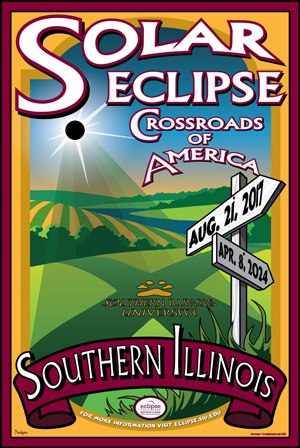by Tim Crosby
CARBONDALE, Ill. – Southern Illinois University Carbondale will once again be an epicenter for a rare celestial event, when a total solar eclipse darkens the sky one year from this week.
The eclipse, set to hit the area at 1:59 p.m. April 8, 2024, is the second such event in seven years. Uniquely perched at the crossroads of the events, Carbondale saw the previous eclipse on Aug. 21, 2017.
The entire country will see at least a partial solar eclipse. But you must be in the narrow path of totality that sweeps across Southern Illinois to experience the unique features of a total solar eclipse. At this time and in the right location you can watch the sky darken as if it were night as the moon blocks out all direct sunlight and the solar corona, the atmosphere of the sun, reveals itself.
Posterwitheclipselogo-sm.jpgWhen witnessing this event for the first time, people are often overcome with emotion and awe as the air cools, planets are visible and an incredible 360-degree sunset is visible. The SIU campus and Carbondale in general is on the centerline of the event and will see 4 minutes and 9 seconds of totality for eclipse 2024, nearly double what was seen in 2017.

SIU’s eclipse website is a good resource for members of the media and the public. Along with a countdown clock, you also can find news, a photo gallery of the 2017 eclipse, educational links and content, information for visitors and important updates. You can also sign up for the newsletter.
A special event coming up this week is “Eclipse 2024 – One Year and One Day to Go,” set for 3-4 p.m. Friday (April 7) at the John C. Guyon Auditorium in Morris Library. Mike Kentrianakis, an eclipse enthusiast and 20-year veteran producer for CBS News, New York, will speak at the event.
Kentrianakis specializes in advising the media in eclipse coverage and has done numerous high-profile interviews related to his eclipse expeditions and experiences.
Also, two groups from SIU made up of faculty researchers and study abroad students will leave next week for Australia in preparation for the total solar eclipse there on April 20. The trip, which will include research and outreach, will help prepare the personnel for the 2024 event, as well.
SIU employs dozens of researchers and experts who can speak on various aspects of the event, including astronomy, effects on wild and domesticated animals, impact on communities, public health and inspiration for the arts and media. Reporters, photographers and camera crews are invited to reach out to our personnel as they plan their coverage leading up to the main event one year from now.
